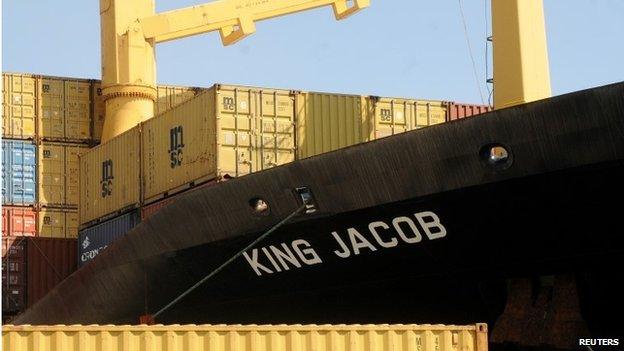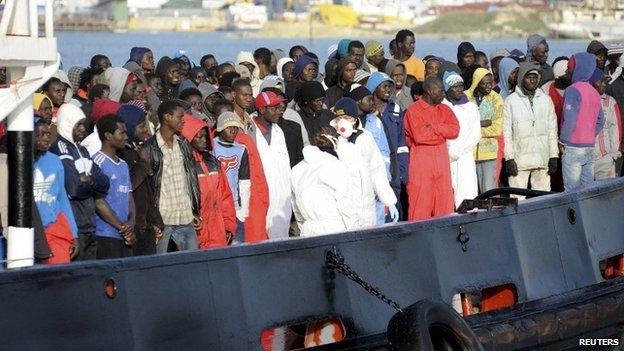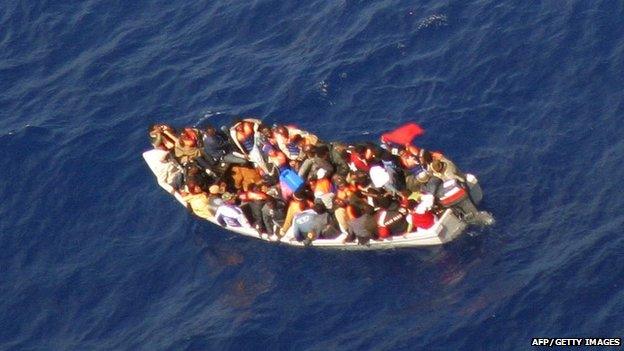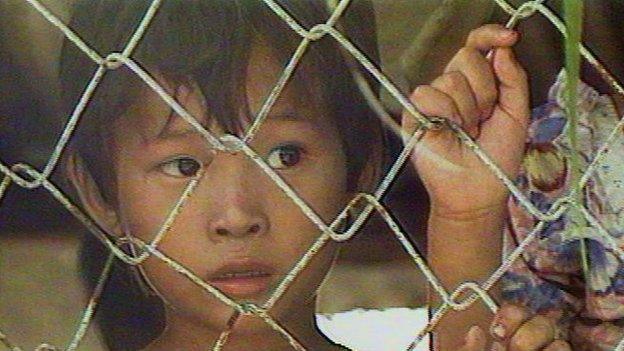Migrant crisis: Should ships help those in need?
- Published

The King Jacob has been called to rescue migrants at least four times
When a migrant ship capsized in the Mediterranean on Sunday, with 700 people on board, it was near a merchant ship, the King Jacob.
The ship was the only one to save anyone from the sea - 28 people were taken on board.
It was not the first time it had carried out a rescue - earlier in the week, it took 480 migrants to Sicily.
Reports in the Italian press said the Portuguese ship had carried out rescues on at least two other occasions.
The International Maritime Organization (IMO) estimates, external that merchant ships rescued 40,000 people from the Mediterranean in 2014. It expects that number to increase substantially this year.
But shipping companies feel they are being made to play too large a role, external in bringing people to safety - and say governments should pay for better surveillance of the seas.
No compensation
Merchant ships are legally bound to rescue those in need, under the 1982 United Nations Convention on the Law of the Sea.
Stopping to help those in distress is also seen, as the IMO says, as "a longstanding maritime tradition" as well as a moral obligation on the ship's master.
However, ships are not compensated for helping in rescues or if they are fined for arriving late at port with any deliveries.

Ships - such as the Maersk Ellen - are legally bound to help those in distress
One vehicle carrier that helped the search for survivors on Sunday, the Maltese-registered City of Lutece, saw its delivery to Pasajes, in Spain, delayed by more than 36 hours.
Ships are also at risk of being in breach of their safety certificates by taking on board more passengers than have been legally agreed upon.
Andrew Linington, a spokesman for Nautilus, a maritime trade union, said: "These days, a merchant ship operates with an average crew of 20.
"So if you go to the rescue of sometimes several hundred people, it can compromise the safety of the entire ship. There is no accommodation for them, the ships are sailing with a minimum amount of food and there are not enough life-saving appliances."
Designed to deter
A further issue, Mr Linington said, is the design of the ships.
"Most ships are designed to pick up only a limited number of people in distress," he said.
"A lot of the ships that go to the Mediterranean have been in the Middle East and have been through problem areas like Somalia, so they are actually equipped with stuff to deter people from coming on board."

Merchant ships rescued 40,000 people from the Mediterranean in 2014
A spokesman for the Allianz insurance firm, that specialises in insuring ships, said vessels were covered under the 1982 UN Convention, and that companies would be recompensed if the ships were damaged during a rescue.
But the issue of whether merchant ships are insured to carry migrants is a grey area. Maritime insurance companies told the BBC that it depends on ships' individual insurance agreements.
Also unclear, they said, is where liability would fall should migrants die or be injured while being rescued by a merchant ship's crew.
Michael Kingston, a maritime lawyer and partner at the DWF law firm in London, said the law was clear about merchant ships' duty to rescue. But he said there was a need for a wider enforcement programme.
He said: "The Italian government have to be commended for what they are trying to do, but I find it staggering that other countries from the EU can't immediately meet to discuss the loss of over 1,000 lives in a week.
"From a funding point of view, there's an obligation on everyone. These migrants are no different to migrants in the past, who were forced to leave their country."

Hundreds of thousands of people fled Vietnam by boat after the war started
In the mid -1970s, while working on a merchant ship in Asia, Allan Graveson helped rescue a group of boat people fleeing Vietnam.
He sees parallels between now and then - when almost 800,000 Vietnamese nationals, external were resettled after fleeing the Communist victory at the end of the Vietnam War.
"I looked down into the boat and all they wanted to do was hug me," he said.
"There were five of them - four hadn't made it and they'd put them overboard. It was the children who were the first to die.
"We picked them up. It's what you did, there were no questions."
Mr Graveson says a similar response is needed now.
"Back then, the UN High Commission for Refugees had camps in Singapore - people landed there, they were given money and sent to new countries. That can work today.
"It took a while to get camps going then. There was prevarication, like now. A lot of what's being said now was being said then. But it worked."